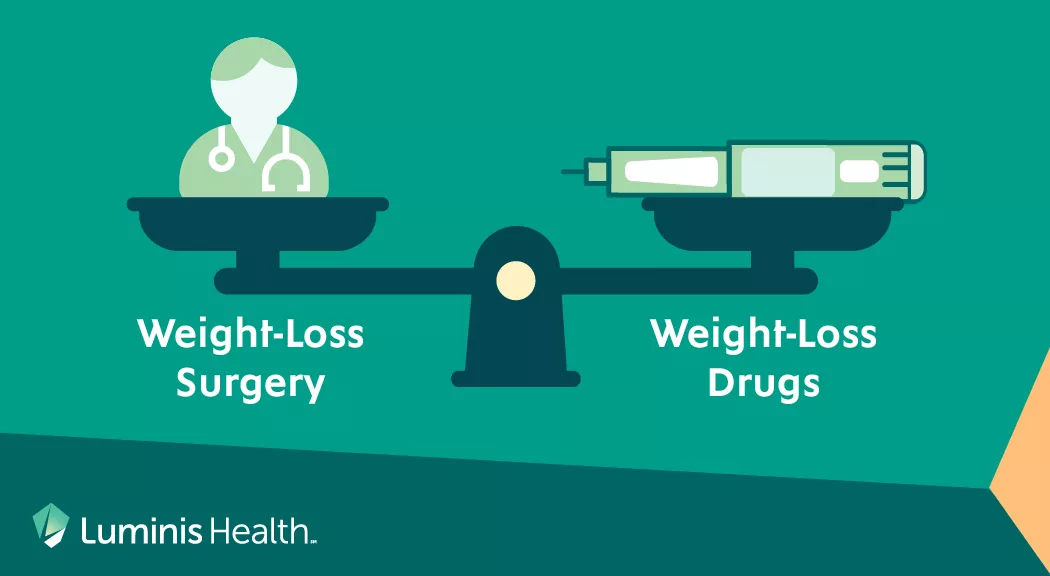Effective January 20, 2026, masks are encouraged for all staff, patients and visitors at all Luminis Health locations and will remain encouraged through the end of the influenza season. Thank you for your patience as we continue to care for our community.

Losing weight can be tough for most of us. You’ve seen the buzz about weight loss drugs, especially the constant speculation that some of the world’s most rich and famous are using them to drop large amounts of weight fast. But are weight loss drugs right for you or is this just another craze? And how do these drugs compare to weight-loss surgery in terms of effectiveness and safety? Can the two be used together? Here’s what you need to know:
Weight Loss Drugs
A weight-loss drug called Ozempic has been receiving the bulk of hype in the news and on social media. The Food and Drug Administration (FDA) first approved Ozempic as a medication for treating diabetes in 2017. Ozempic’s active ingredient is semaglutide, which the FDA approved in 2021 to treat obesity. Similar new medications are expected soon.
Semaglutide works by mimicking the hormone that is responsible for sending signals to our brains that say, “I’m full.” This allows you to burn calories and fat without feeling hungry. It also reduces the speed at which food passes through your digestive system, helping maintain a feeling of fullness longer. Semaglutide is designed to be injected once a week under the skin of the stomach, thigh or upper arm. Semaglutide is not a miracle drug and it’s not for everyone. You should consult your doctor first, beware buying the drug online, and be mindful that it might not be covered by insurance for losing weight.
Side effects can include nausea, stomach pain, constipation, diarrhea and vomiting. Because these drugs are fairly new, there are still a lot of unanswered questions, such as: When people come off weight-loss drugs after a set number of months, will they maintain their weight? Or will they have to take the medications for the rest of their life?
Weight Loss Surgery
Here in the United States, weight loss—also known as bariatric—surgery continues to be a popular option to help people lose weight and manage conditions related to obesity. There are various surgical procedures for weight loss, and all of them help you lose weight by limiting how much food you can eat and working on a hormonal level to assist with sensitivity to sugars and feeling full. Weight-loss surgery has been around for a long time with established and proven success.
After weight-loss surgery, eating habits must be adjusted, with smaller portion sizes and a focus on protein since it is a building block of all cells in our bodies. In addition, fruits, vegetables and whole grains can be eaten, with the goal of avoiding added sugars.
Combining the Two
If you are preparing for weight-loss surgery, it’s common to take weight-loss medications beforehand. Whether taking these medications for Type 2 diabetes or specifically for weight loss makes no difference: Losing extra pounds before surgery will help make the surgery safer. Weight-loss drugs may also help patients lose weight if they’ve gained a few pounds after weight-loss surgery.
Final Thoughts
Both weight-loss surgery and weight-loss drugs are only part of an overall treatment plan you should create with your healthcare provider. An effective weight-loss plan will also include nutrition, exercise and mental health care. It can be challenging at times, but we are here to help you achieve your weight-loss goals. Remember, there are no quick fixes, obesity is a chronic disease that must be monitored and managed for the rest of your life.
To learn more about weight loss surgery, visit Luminis Health’s website or call 443-481-6699. We also have free webinars scheduled in July and August to start your weight loss journey. Click here to register.
Jilian Nicholas, DO, is a board-certified, fellowship-trained bariatric surgeon at Luminis Health.
Nowreen Haq, MD, is an endocrinologist at Luminis Health who focuses on cardio metabolic outcomes, complex diabetes, obesity and transgender endocrinology.



